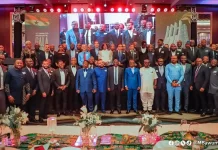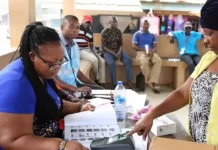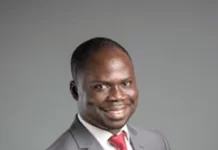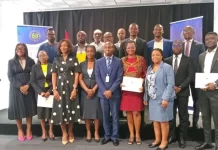
Finance Minister Ken Ofori-Atta is urging African states
to spare no effort at growing the African Development Bank (AfDB) as the
largest provider of capital to the continent.
He says the very essence of ongoing integration efforts which are also
confronted by enormous infrastructural gaps demand that nations redouble
efforts to achieve this, stressing that the continent cannot afford to be
apologetic about the need to recapitalize the AfDB.
He gave the assurance that Ghana is ready to lead the charge.
In his address as a governor of the AfDB at the Bank’s recent 54th Annual
Meetings in Malabo, Equatorial Guinea, Ken Ofori-Atta said confronting the
structural and institutional networks challenges on the continent, which are at
the core of integration efforts, is an urgent need.
He said poor infrastructure is understood to cut-off up to two percent of
Africa’s average per capita growth rates, however, new estimates suggest that the
continent’s infrastructure needs amount to $130–170 billion a year, with a
financing gap in the range $68–$108 billion, calling the situation as a matter
of human rights and social justice.
He said while Africa is not unique in its infrastructure investment gap, given
that there is a global need for $3.7 trillion in infrastructure investment each
year, with only $2.7 trillion of which is invested, “Africa’s unique potential
in terms of demographic and institutional changes requires of us to address this
issue with urgency.”
Integration must succeed
The Finance Minister said Ghana is already “scaling up and offering
infrastructure development a big-push.”
“Our efforts toward constructing the ‘Central Spine’ railway that runs from the
port cities of Accra, Tema and Takoradi through the heart land of Ghana to the
borders of Burkina Faso is illustrative of our commitments in this direction.
“However, and as it will be readily admitted here, the scope of some projects
are so costly that national balance sheets alone may not make them viable. Seen
from that perspective, supporting the institution of both regional and
sub-regional risk sharing schemes that leverage financing for infrastructure
would be essential. This could unlock significant flows of over US$40 trillion
of private capital from the rich countries for infrastructure improvements on
the continent,” he said.
Ken Ofori-Atta said achieving this would be a key breakthrough for
infrastructural and institutional integration that supports transformation for
wealth creation across the continent.
“In previous meetings, I proposed, among other things, the need to consider the
recapitalization of our Bank in order for it to play these key roles that meet
the aspiration of all members and partners. Today, I urge member states to
redouble their efforts to pay-up and to support strongly the Bank in its
current drive to increase its capital even as we encourage non-regionals to
strongly support us. Ghana is committed to putting AfDB on the path to be the
largest provider of capital on the continent. An Africa Beyond Aid cannot be
achieved if we do not bring the full brunt of our history and legacy of
resilience to bear on this most crucial continental need,” he said.
He stressed that having voiced support for promoting the African dream to
integrate, there is need to optimize and marshal the tools and knowledge to
change the usually unfavorable narrative on the continent in our lifetime.
“This is the charge we have … A continent to transform. This is doable and we
cannot fail. The world needs and as it is said, “to bend the arc of history …
Africa must succeed”. May God continue to sustain this dream and give us
courage, strength and direct our efforts. God bless us all.”
Graphic
























